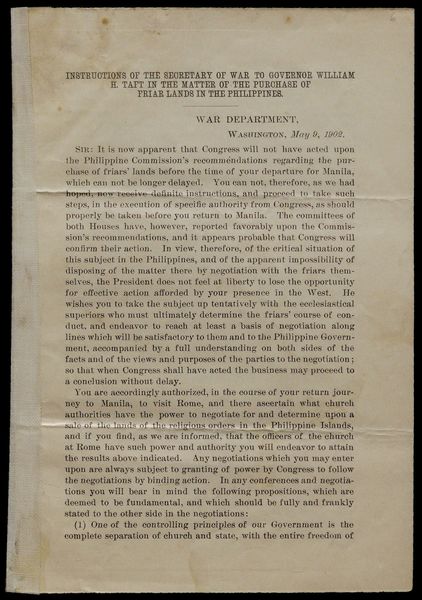Root, Elihu (1845-1937) Instructions of the Secretary of War to Governor William H. Taft in the matter of the purchase of the Friar Lands in the Philippines.
High-resolution images are available to schools and libraries via subscription to American History, 1493-1943. Check to see if your school or library already has a subscription. Or click here for more information. You may also order a pdf of the image from us here.
A high-resolution version of this object is available for registered users. LOG IN
Gilder Lehrman Collection #: GLC01625.04 Author/Creator: Root, Elihu (1845-1937) Place Written: Washington, D.C. Type: Document Date: 9 May 1902 Pagination: 3 p. Order a Copy
Because Congress has not yet acted on recommendations of the commission in regards to the Friar Lands of the Philippines and Taft cannot delay his return there, the President authorizes Taft to travel to Rome to determine which authorities of the Roman Catholic Church in the Philippines have the right to sell the lands. His errand is not diplomatic, but official assistance will be rendered to him.
Citation Guidelines for Online Resources
The copyright law of the United States (title 17, United States Code) governs the making of photocopies or other reproductions of copyrighted material. Under certain conditions specified in the law, libraries and archives are authorized to furnish a photocopy or other reproduction. One of these specific conditions is that the photocopy or reproduction is not to be “used for any purpose other than private study, scholarship, or research.” If a user makes a request for, or later uses, a photocopy or reproduction for purposes in excess of “fair use,” that user may be liable for copyright infringement. This institution reserves the right to refuse to accept a copying order if, in its judgment, fulfillment of the order would involve violation of copyright law.
